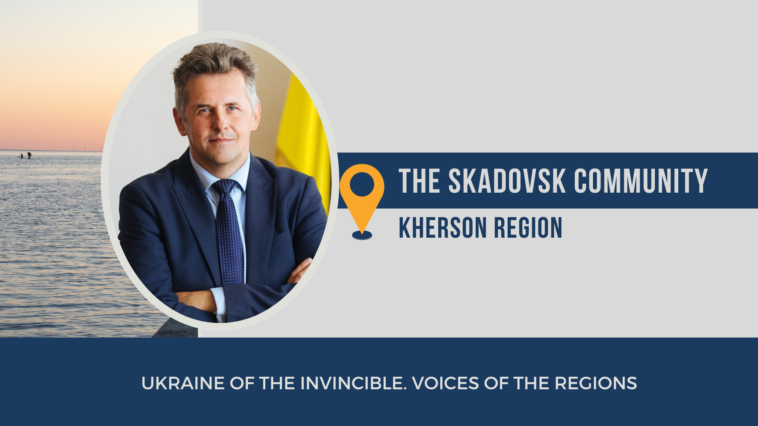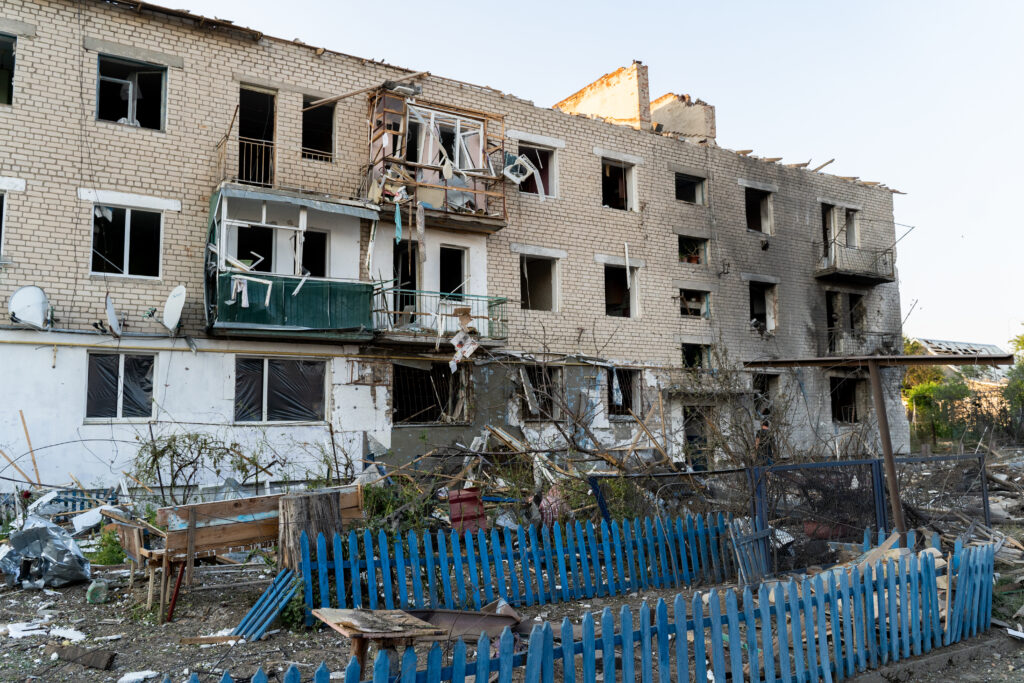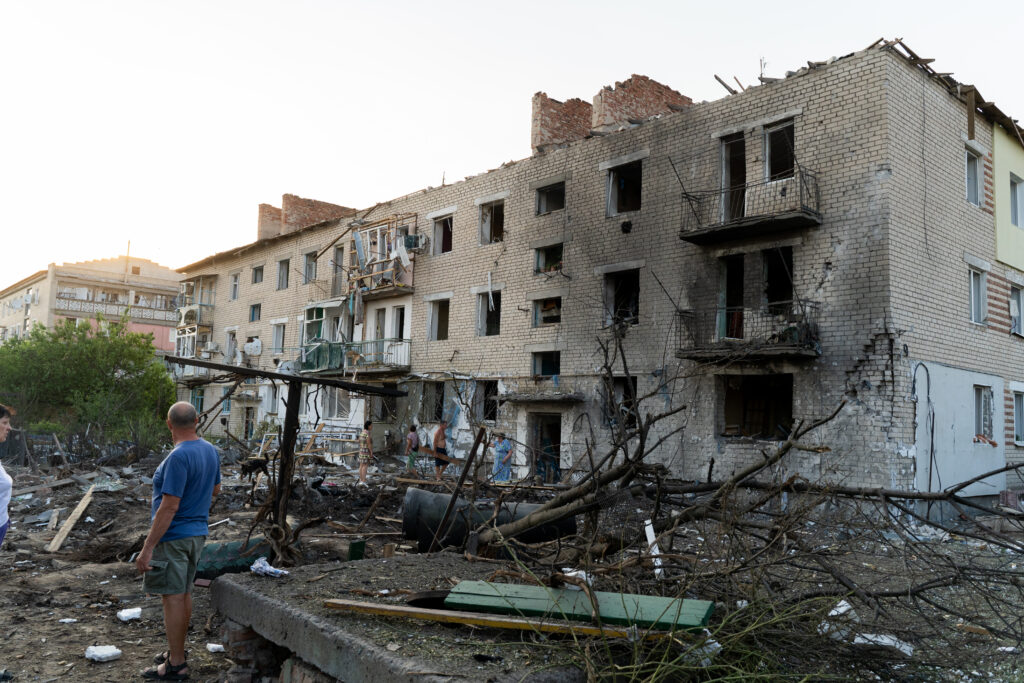Skadovsk city community of Kherson region was formed in 2020. 18 villages and 9 settlements united around the city then. Together they created a territory with an area of 776 square kilometers. Before the war, the population of the community was 34,000.
The main advantage of the community is its unique natural conditions. Skadovsk is a well-known climatic resort, which is visited by about 50,000 people every year.
Usually in the middle of summer there are thousands of guests on the city beach. Families with children especially like to relax here, because the sea in Dzharylhats’ka Gulf is shallow and warm. All-Ukrainian art festivals and competitions, the popular children’s festival “Black Sea Games”, sports competitions, and other events were held in the city every year, which attracted guests and helped the city to develop.
Today, the city beach is almost empty. At the beginning of July, fragments of a rocket fell here, which frightened the few visitors even more.
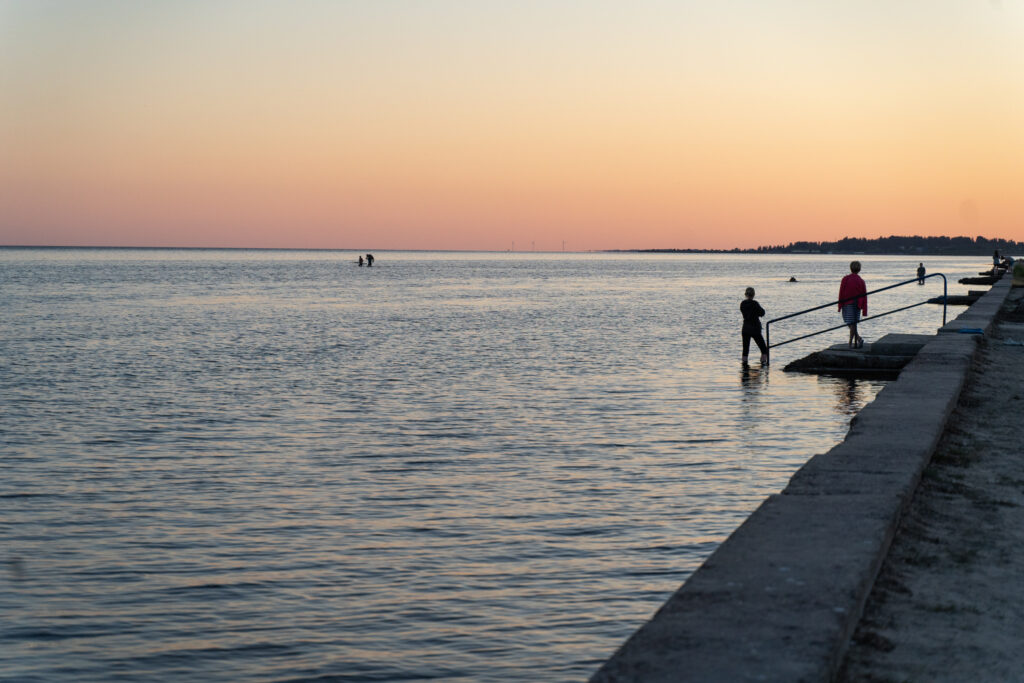
Mayor Oleksandr Yakovlev left the city on April 3, after the occupiers began persistently offering cooperation, threatening with “convincing talks in the basement” in case of refusal.
He recalls the first days of the occupation as follows:
“At 6:30 we were at work. At that time, there was no police, SBU (Security Service), prosecutor’s office in the city – they all left. The district administration informed that they have an order and they are evacuating as well. We were left alone in the city and continued to live.”
Russians first appeared in Skadovsk on March 9. They came to the city council, gathered the workers in the yard, checked the documents, and checked whether there were any weapons. On the same day, stationary computers and laptops were taken away, as if to search for some prohibited materials.
It was dangerous to stay in the city council. And what to do without technology and the Internet? We decided to switch to remote work mode.
“The next time Russians came was March 16. They arrested me, my deputy, Oleksandr Hryshchenko, and the secretary of the city council, Yury Palyukh. We were taken to the police station, where we were held until 6:00 p.m. After we were released and told to: “Work.” They asked about the participants of the ATO, who leads the “saboteurs”, where we have weapons, why we created a patrol and why we follow them, to whom do we pass the data,” the mayor says.
Since the police were no longer there, from the first day of war a public order service was created in Skadovsk to protect against looters. The occupiers perceived this as an attempt to resist them, to organize partisanship. At that time, a large rally gathered in the center of the city – people demanded that the Russians leave and release us. Repression began in response. Units of the Russian Guard arrived and took up residence in the police station.
Initially, Russians weren’t intimidating the mayor. Rather, they tried to encourage cooperation.
“For example, they brought their humanitarian aid, and they told us that we have to accept it,” explains Oleksandr Yakovlev. – I refused. They brought it themselves, then again they offered to give it to us. We said again that we would not do that. It didn’t suit them, of course. They began to threaten: “If you do not cooperate, you will go to the basement.”
The vast majority of people do not want to cooperate with the occupiers, they resist the best they can. There were cases when Russian flags were taken down in villages and in the city. At the end of June, there was an attempted murder on a local businessman who was helping the Russians, but it turned out to be unsuccessful.
How does the community live today? According to Yakovlev, communal services are functioning – water supply, garbage collection, cleaning. The work is carried out by the social protection department, it is possible to distribute humanitarian aid in small quantities and provide financial support through public organizations. Social welfare workers also continue to serve people who need special care at home. Although resources are very limited, transportation is difficult. There is one public transport route in the city. However, there is a bus connection with Kherson.
Of course, there is no resort life. Almost everything is closed: boarding houses, recreation centers, hotels, amusement parks. Locals work a little at the waterfront, selling food and drinks. But the last “arrival” on July 6 near the beach, when a child was injured, scared people away from this area even more.
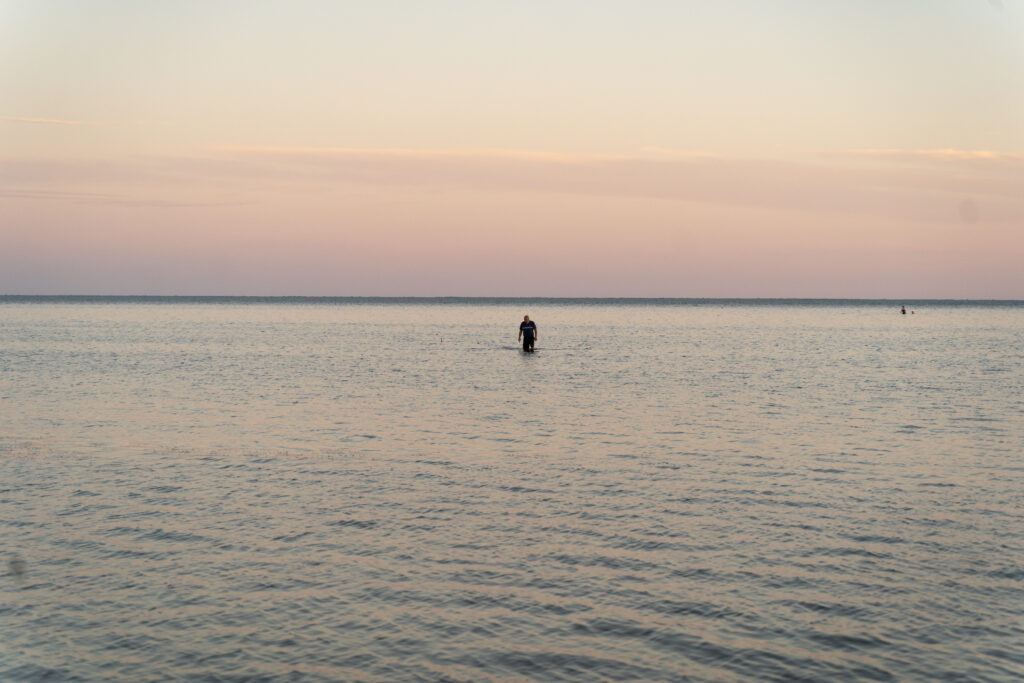
Harsh informational pressure is imposed on local residents. Russians are trying to convince them that Russia is there forever, that they are not going anywhere now and must agree to cooperate, live on. There is a propaganda blockade.
“People are cut off from Ukrainian mobile communications and the Ukrainian Internet. There is Russian Internet. People try to work around these restrictions in using the network, but it is still problematic for many. There is no cash, banks are not working, people who received pensions through Post of Ukraine are unable do so now,” the mayor said.
There is no war without traitors. There are such people in Skadovsk as well – from the head of the occupation administration, Serhii Shvaik, to several heads of educational institutions. But there are not many of them, Yakovlev notes:
“Not a single kindergarten or school director agreed to cooperate. They find someone from within the institution or from outside who agrees to be the manager and announce that they have appointed a new director. Of course, all this is outside the legal field. According to my information, two of the eleven city schools have new “heads” – No. 1 and No. 3. They hired people who worked there before. And the same with kindergarten No. 3. At the same time, educators in our community receive their full salary. They are currently on vacation.”
No one expected that this would happen to Ukraine. Although, according to the mayor, it was necessary to prepare more actively for various options for the development of events and difficulties.
“Our Territorial Defense was actually created only at the end of January 2022,” he admits. “We allocated them a quarter. But until February 24, they did not start their normal activities. They were not fully equipped. It would be necessary to prepare for the scenarios of electricity and communication blackouts, prepare national resistance, cooperate more with the military. And so it can be said that our people were actually not ready for this.”
But it seems that the Ukrainians made their conclusions already in the first month of the war. The most important of them is that everyone should do their best at their place.
“Thanks to this, we still live in Ukraine and fight for the liberation of our entire territory. In my opinion, Ukraine is effectively resisting Russian aggression. We did not let the enemy go any further, we liberated part of the territory captured after February 24. Today, Ukrainians show themselves as a courageous people, united by the goal of liberating our lands from the enemy. It’s only a matter of time and resources,” says Mayor Oleksandr Yakovlev. He is confident: “Skadovsk was and is a Ukrainian city to which we will return.”
Ivan Antipenko
The material is prepared within the project “Countering Disinformation in Southern and Eastern Ukraine” funded by the European Union.

